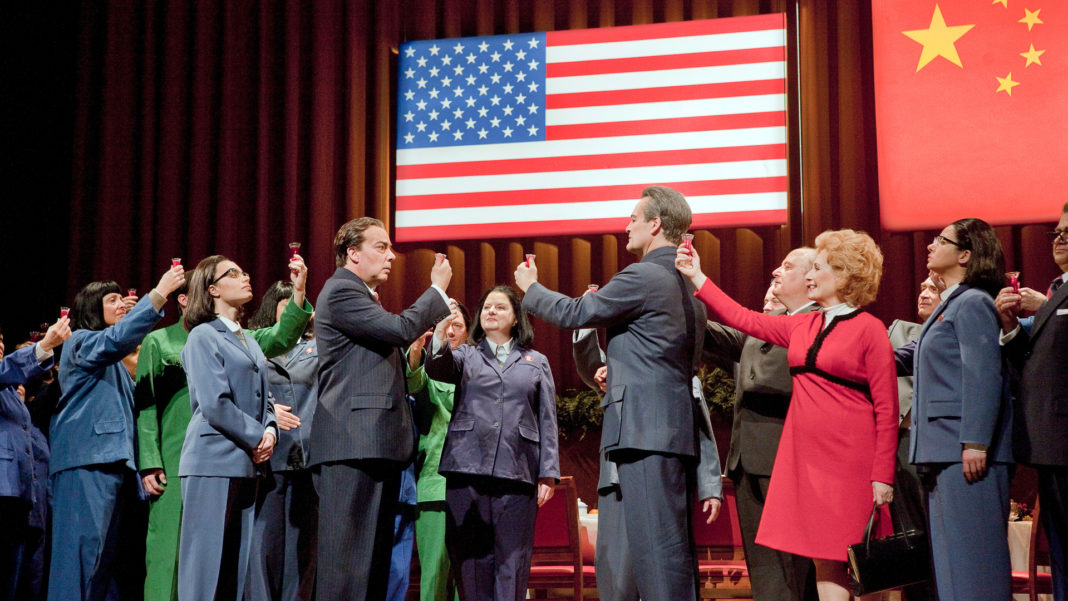This week leads up to the 245th birthday of America. Appropriately Week 68 at the Met will honor the July 4th holiday (which falls on Sunday) with a week of operas composed by American composers.
A pair of composers have two operas being shown this week: John Adams (Doctor Atomic and Nixon in China) and Philip Glass (Akhnaten and Satyagraha). Also represented are John Corigliano, Nico Muhly and Kurt Weill (technically German, but he ultimately became an American citizen).
Since the Met is re-running productions as the bulk of their weekly streaming schedule, I’m going to mix in interviews with the performers and creators in place of clips to avoid the redundancy of showing the same few clips available. Let me know your thoughts!
All productions become available at 7:30 PM EST/4:30 PM PST and remain available for 23 hours. Schedules and timings may be subject to change.
The Met is heavily promoting their Met Stars Live in Concert series and the planned resumption of performances in the 2021-2022 season, so you’ll have to go past those announcements and promos to find the streaming productions on the Metropolitan Opera website.
If you read this column early enough on June 28th, you’ll still have time to see the 2016-2017 season production of Verdi’s La Traviata that was part of Pride Week.
Here is the full line-up for Week 68 at the Met:
Monday, June 28 – Nico Muhly’s Marnie – 3rd Showing – STRONGLY RECOMMENDED
Conducted by Roberto Spano; starring Isabel Leonard, Iestyn Davies and Christopher Maltman. This Michael Mayer production is from the 2018-2019 season.
Muhly’s opera, with a libretto by Nicholas Wright, had its world premiere at the English National Opera in 2017. The opera is based on Winston Graham’s 1961 novel.
If the title, Marnie, sounds familiar, this is based on the same novel by Winston Graham that inspired Alfred Hitchcock’s 1964 film. The title character is a woman who steals from people, changes her identity and quickly moves on to other victims. Until an employer catches her and blackmails her.
Anthony Tommasini, in his review for the New York Times, said of the opera, “Marnie benefits from the director Michael Mayer’s sleek and fluid staging, with inventive sets and projections designed by Julian Crouch and 59 Productions. (It was first seen last year in London for the work’s premiere at the English National Opera.) Scenery changes are deftly rendered through sliding and descending panels on which evocative images are projected.
“Mr. Muhly’s music could not have had a better advocate than the conductor Robert Spano, making an absurdly belated Met debut at 57. He highlighted intriguing details, brought out myriad colorings, kept the pacing sure and never covered the singers.”
Tuesday, June 29 – John Adams’s Doctor Atomic – 3rd Showing
Conducted by Alan Gilbert; starring Sasha Cooke, Thomas Glenn, Gerald Finley, Richard Paul Fink and Eric Owens. This Penny Woolcock production is from the 2008-2009 season.
This John Adams opera had its world premiere in 2005 in San Francisco and features a libretto by Peter Sellars. The main source of inspiration for the libretto was declassified government documents from individuals who worked at Los Alamos on the development of the atomic bomb.
Act one of Doctor Atomic takes place approximately one month before the first test. The second act takes place the morning of that test in 1945. At the center of it all is Robert J. Oppenheimer (Finley).
In his review for the New York Times, Anthony Tomassini said of Adams’s score: “This score continues to impress me as Mr. Adams’s most complex and masterly music. Whole stretches of the orchestral writing tremble with grainy colors, misty sonorities and textural density. Mr. Gilbert exposes the inner details and layered elements of the music: obsessive riffs, pungently dissonant cluster chords, elegiac solo instrumental lines that achingly drift atop nervous, jittery orchestral figurations.”
Wednesday, June 30 – John Corigliano’s The Ghosts of Versailles – 4th Showing – STRONGLY RECOMMENDED
Conducted by James Levine; starring Håkan Hagegård, Teresa Stratas, Renée Fleming, Gino Quilico and Marilyn Horne. This Colin Graham production is from the 1991-1992 season.
Beaumarchais is the playwright who wrote the plays that inspired Rossini’s The Barber of Sevilleand Mozart’s The Marriage of Figaro. His third play in that series, The Guilty Mother, serves as the inspiration for this opera by John Corigliano and librettist William M. Hoffman.
In the opera, ghosts occupy the theatre at Versailles. Marie Antoinette, not too happy about her execution, spurns the advances of Beaumarchais. He offers his new opera, A Figaro for Antonia, as a means to win her love and change her fate. Now an opera appears within the opera, utilizing the familiar Figaro characters.
The Metropolitan Opera commissioned this work for its 100th anniversary in 1983. It wasn’t performed there until eight years after that centennial. This film is from those performances.
I interviewed Corigliano when LA Opera performed The Ghosts of Versailles. Here’s what he told me about how he handled opening night at the Met:
“The premiere of the opera, this is what I did. I sent out for a take-out chicken. I had a bottle of wine and ten milligrams of valium. I ate the chicken, took the valium and wine to the opening. If you’re asking about something that happened at opening night, I was a zombie. It was traumatizing. I’d never written an opera, it was overwhelming. I couldn’t face it without a little help.”
Both this Metropolitan Opera production and the more recent The LA Opera production were amazing and I personally think Corigliano had nothing to worry about. This is a terrific work.
Thursday, July 1 – Philip Glass’s Satyagraha – 3rd Showing – STRONGLY RECOMMENDED
Conducted by Dante Anzolini; starring Rachelle Durkin, Richard Croft, Kim Josephson and Alfred Walker. This is a revival of Phelim McDermott’s 2008 production from the 2011-2012 season.
This Philip Glass opera had its world premiere in 1980 in Rotterdam. The libretto was written by Glass and Candace DeJong. The title means “insistence on truth” in Sanskrit.
The life of Gandhi is depicted in a story that goes backwards and forwards through time as a way to examine his life in South Africa and leading to his belief in non-violent protests. Sung in Sanskrit with projected titles on the stage itself, this is one unique opera that is staged beautifully and powerfully.
James R. Oestreich, writing in the New York Times, said of this revival (which took place during a celebration of the the composer’s 75th birthday):
“The singers were exceptionally fine and well matched, starting with the tenor Richard Croft, strong yet vulnerable as Gandhi. Like Mr. Croft, Rachelle Durkin as Gandhi’s secretary, Miss Schlesen; Maria Zifchak as his wife, Kasturbai; and Alfred Walker as his Indian co-worker Parsi Rustomji were veterans of the 2008 premiere, and all were excellent except for a bit of strain in Ms. Durkin’s sustained high work in the newspaper scene. Kim Josephson was also strong as Gandhi’s European colleague Mr. Kallenbach.”
I challenge anyone to get to Satyagraha‘s final aria, “Evening Song,” and not be utterly moved.
Friday, July 2 – John Adams’s Nixon in China – 4th Showing
Conducted by John Adams; starring Kathleen Kim, Janis Kelly, Robert Brubaker, Russell Braun, James Maddalena and Richard Paul Fink. This Peter Sellars production is from the 2010-2011 season.
Nixon in China had its world premiere in Houston in 1987 in a production directed by Peter Sellars. Inspired by President Nixon’s trip to China in 1972, the opera features a libretto by Alice Goodman.
It was wholly unlikely that someone as anti-Communist as Nixon would make a trip to China. That trip forged new relations between the two countries and helped thaw the icy relationship the United States had with the then Soviet Union. Nixon and his wife Pat, Chou En-lai, Mao Tse-tung, Henry Kissinger and Madame Mao all play prominent roles in the opera.
This 2011 production, while a Met debut for Nixon in China, was not the New York debut of the opera. It was performed at the Brooklyn Academy of Music (BAM) in 1987 following its premiere in Houston. Critical reaction upon its premiere was quite mixed.
By the time of this production (which found Sellars revisiting his original work and that of a 2006 revival), Anthony Tommasini in the New York Times called it an “audacious and moving opera.”
Saturday, July 3 –Weill’s Rise and Fall of the City of Mahagonny – 2nd Showing
Conducted by James Levine; starring Teresa Stratas, Astrid Varnay, Richard Cassilly and Cornell MacNeil. This John Dexter production is from the 1979-1980 season.
Kurt Weill’s Rise and Fall of the City of Mahagonny had its world premiere in Leipzig in 1930. The libretto, of course, is by Bertolt Brecht.
Three fugitives and four lumberjacks make their way to Mahagonny. The fugitives are trying to elude the authorities and enjoy themselves in a city where men can get all their needs met. The lumberjacks are looking for opportunity.
A prostitute named Jenny is, at first, attracted by the presence of the fugitives and their money. But she finds herself falling for one of the lumberjacks, Jimmy, who gets more and more in debt as the opera progresses.
As both personal and city financial problems mount, the lives of all eight characters will be changed forever and the shining city will collapse into chaos.
This was the first ever production of this opera at The Met. Harold C. Schonberg, writing in the New York Times, opened his review this way:
“The Weill‐Brecht Rise and Fall of the City of Mahagonny came to the Metropolitan Opera Friday night, and at least one question about the work was answered. There were those who predicted that Mahagonny with its cabaret roots, smallish orchestra and jazz elements, would not ‘go’ in a house as big as the Met’s. It does. Whether or not it is an opera, and Weill strongly insisted that it is, it does use voices skillfully, it has a big chorus, and it was not lost on the stage of the big house.”
Sunday, July 4 – Philip Glass’s Akhnaten – 6th Showing – STRONGLY RECOMMENDED
Conducted by Karen Kamensek; starring Dísella Lárusdóttir, J’Nai Bridges, Anthony Roth Costanzo, Aaron Blake, Will Liverman, Richard Bernstein and Zachary James. This Phelim McDermott production is from the 2019-2020.
Akhnaten is one of Glass’s three biographical operas (the others are Einstein on the Beach and Saturday’s opera, Satyagraha.) The composer also wrote the libretto with the assistance of Shalom Goldman, Robert Israel, Richard Riddell and Jerome Robbins.
Akhnaten was a pharaoh who was controversial for his views on worshipping more than one God. He suggested just worshipping one – the sun. He was husband to Nefertitti and father of Tutankhamun. This opera does not have a linear storyline.
In his New York Times review, Anthony Tommasini praised the leads:
“Wearing gauzy red robes with extravagantly long trains, Mr. Costanzo and Ms. Bridges seem at once otherworldly and achingly real. His ethereal tones combine affectingly with her plush, deep-set voice. Ms. Kamensek, while keeping the orchestra supportive, brings out the restless rhythmic elements that suggest the couple’s intensity.”
I’ve seen this production with Costanzo singing the title role and cannot recommend taking the time to watch Akhnaten highly enough.
That’s the full line-up for Week 68 at the Met. At press time we had no details for next week.
Enjoy your week! Enjoy the operas! Happy Birthday America!
Photo: James Maddalena, Russell Braun and Janis Kelly in Nixon in China (Photo by Ken Howard/Courtesy Metropolitan Opera)











